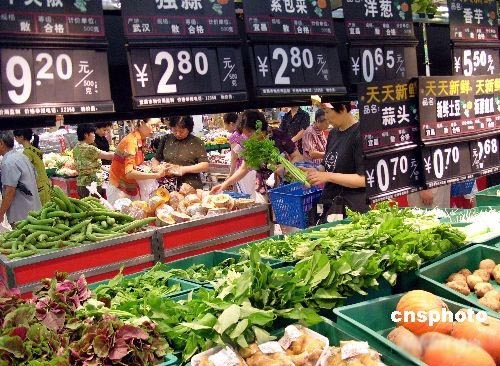China's CPI up 6.2% in August
 0 Comment(s)
0 Comment(s) Print
Print E-mail
Xinhua, September 9, 2011
E-mail
Xinhua, September 9, 2011
|
|
|
The consumer price index (CPI) slowed to 6.2 percent in August and food prices rose 13.4 percent, the National Bureau of Statistics (NBS) said on Friday. |
China's inflation eased in August from a 37-month high as the country's economy cooled and global uncertainties lingered.
The consumer price index (CPI), a main gauge of inflation, slowed to 6.2 percent in August, the National Bureau of Statistics (NBS) said on Friday.
The NBS said food prices rose 13.4 percent in August. Prices of 18 types of vegetables rose 1.5 percent last week, according to data from the Ministry of Commerce. The growth rate was 4.6 percentage points lower than one week earlier, indicating that food prices are stabilizing.
The CPI surged to 6.5 percent in July, driven mostly by food prices which had jumped 14.8 percent from a year earlier. The figure was far above the Chinese government's full-year target of 4 percent for 2011.
Stabilizing consumer prices remains the top priority on the Chinese government's macro-regulation agenda, Premier Wen Jiabao wrote in an article published last week in the latest issue of Qiushi, or Seeking Truth, the Communist Party of China Central Committee's flagship magazine.
To curb soaring inflation, the People's Bank of China, the country's central bank, has raised the benchmark interest rate three times this year and increased the reserve requirement ratio six times.
"The Chinese economy is slowing down due to a slew of tightening policies, and debt woes in Europe and the U.S. add to uncertainties in the global economy, so the government will observe for a while before introducing more macro measures," said Ba Shusong, a researcher with the Development Research Center of the State Council, or China's Cabinet.
China's gross domestic product rose by 9.5 percent year-on-year in the second quarter of 2011, tapering off slightly from the 9.7-percent growth posted in the first quarter and 9.8 percent in the fourth quarter of last year.
Although some economic indicators eased, many government officials have said China's economy will not see a hard landing but instead stabilize with relatively fast growth.
Nevertheless, rising production costs, natural disasters and media speculation could enhance the public's expectations on inflation, according to the National Development and Reform Commission, the country's top economic planner.
Many analysts expect China to face heightened pressure from imported inflation, as the weakening U.S. dollar, a result of an ultra-loose monetary policy in the United States, could further push up commodity prices.
U.S. President Barack Obama has urged Congress to pass the American Jobs Act, a 447-billion-dollar stimulus plan. It will be the third major stimulus package since the 2008 outbreak of the latest international financial crisis.
Meanwhile, Europe's worsening debt crisis dampened global economic prospects.
"The fundamental way to stem soaring consumer prices is to curb investment and demand," said Wang Jun, an analyst with the China Center for International Economic Exchanges.
On a month-on-month basis, the CPI increased 0.3 percent from July.
The Producer Price Index, which is used to calculate inflation at the wholesale level, jumped 7.3 percent year-on-year in August.






